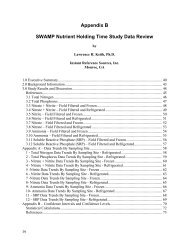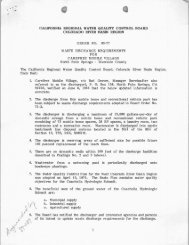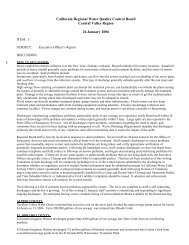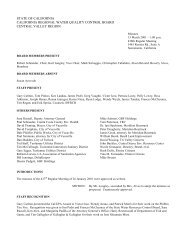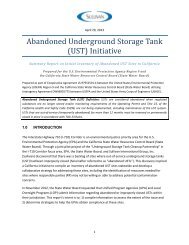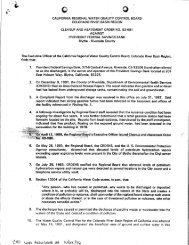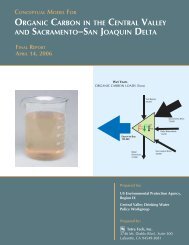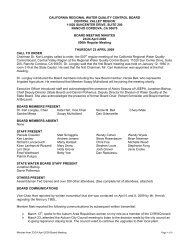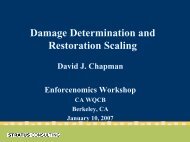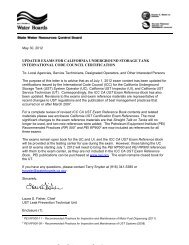Waste discharge to land regulation - State Water Resources Control ...
Waste discharge to land regulation - State Water Resources Control ...
Waste discharge to land regulation - State Water Resources Control ...
You also want an ePaper? Increase the reach of your titles
YUMPU automatically turns print PDFs into web optimized ePapers that Google loves.
CALIFORNIA WATER BOARDS<br />
<strong>State</strong> <strong>Water</strong> <strong>Resources</strong> <strong>Control</strong> Board<br />
Regional <strong>Water</strong> Quality <strong>Control</strong> Boards<br />
<strong>Water</strong> Board Function: <strong>Waste</strong> <strong>discharge</strong> <strong>to</strong> <strong>land</strong> <strong>regulation</strong><br />
Regulation of all point source <strong>discharge</strong>s of waste <strong>to</strong> <strong>land</strong> that does not require full<br />
containment, does not involve confined animal facilities, and does not involve <strong>discharge</strong><br />
of a pollutant <strong>to</strong> a surface water of the United <strong>State</strong>s that is subject <strong>to</strong> the federal Clean<br />
<strong>Water</strong> Act.<br />
<strong>Water</strong> Board Program(s) Relevant <strong>to</strong> Function:<br />
<strong>Waste</strong> Discharge Requirements (WDR) Program (in the past also referred <strong>to</strong> as the<br />
Non-15 program).<br />
Problem/Issue Description:<br />
Discharges of waste <strong>to</strong> <strong>land</strong> that are not contained in a <strong>land</strong>fill or waste management<br />
unit have the potential <strong>to</strong> affect water quality of both surface water and groundwater.<br />
WDR Program <strong>discharge</strong>s are the most diverse of the core regula<strong>to</strong>ry programs and<br />
include:<br />
• Discharge of sewage from municipal treatment plants, private utility treatment<br />
plants, small private treatment plants and larger septic tank/leachfield systems<br />
serving commercial, industrial, and residential developments.<br />
• Production of recycled water from municipal sewage, and the distribution and use<br />
of recycled water by various types of users.<br />
• Treatment and <strong>discharge</strong> of domestic sewage sludge and biosolids.<br />
• Discharge of processing wastewater from sand and gravel and other mining<br />
operations not involving navigable surface water and not subject <strong>to</strong> Title 27.<br />
• Discharge of industrial wastewater from power plants, oilfield production, etc.<br />
• Discharge of wastewater, waste residuals, treated sludge, and recycled water<br />
from food processing plants and operations (packing, cooling, peeling, dicing,<br />
fermenting, brining, canning, etc.) for milk, cheese, <strong>to</strong>ma<strong>to</strong>es, olives, wine, and<br />
many other fruits and vegetables, etc.<br />
• Discharge of wastes from minor surface water dredging projects and all<br />
<strong>discharge</strong>s in addition <strong>to</strong> dredging that occur <strong>to</strong> surface waters not waters of the<br />
United <strong>State</strong>s.<br />
• Discharge of wastes from water supply treatment plants.<br />
• Discharge of treated water supplies for aquifer s<strong>to</strong>rage and recovery projects,<br />
and similar disposition of untreated water supplies and s<strong>to</strong>rmwater used for<br />
groundwater replenishment and as water banking projects.<br />
• Discharge of treated groundwater from remedial actions at leaking underground<br />
tank and other spill sites.<br />
Overview of Function:<br />
The California <strong>Water</strong> Code (CWC) requires any person discharging waste or proposing<br />
<strong>to</strong> <strong>discharge</strong> waste (other than in<strong>to</strong> a community sewer system) that could affect the<br />
quality of waters of the <strong>State</strong> <strong>to</strong> file a report of waste <strong>discharge</strong>. Filing of a report of<br />
<strong>Waste</strong> <strong>discharge</strong> <strong>to</strong> <strong>land</strong>
waste <strong>discharge</strong> requires a fee, standard forms, and supporting technical information.<br />
The supporting technical information describes the wastes, the surface features and<br />
geology of the site, treatment and control of the waste, nearby <strong>land</strong> uses, all waters<br />
potentially affected by the <strong>discharge</strong>, et seq. The Regional <strong>Water</strong> Board can waive filing<br />
of a report but once a report is filed it must either waive or adopt waste <strong>discharge</strong><br />
requirements. The CWC authorizes imposition of administrative civil liabilities for failure<br />
<strong>to</strong> file a report of waste <strong>discharge</strong> and for <strong>discharge</strong> of waste before obtaining either a<br />
waiver or waste <strong>discharge</strong> requirements unless certain conditions are met. The law<br />
provides 140 days <strong>to</strong> waive or adopt waste <strong>discharge</strong> requirements once a filed report<br />
of waste <strong>discharge</strong> has been determined complete, and more time when CEQA<br />
documents must be prepared.<br />
Each waste <strong>discharge</strong> requirements order contains conditions intended <strong>to</strong> ensure the<br />
<strong>discharge</strong> conforms <strong>to</strong> the <strong>Water</strong> Code. Multiple fac<strong>to</strong>rs must be considered in<br />
determining reasonable conditions of <strong>discharge</strong> and the quality that should be<br />
maintained in groundwater, including the relevant water quality control plans and water<br />
quality objectives. Where a group of <strong>discharge</strong>s are similar, use similar treatment, and<br />
occur under similar conditions, a general order containing waste <strong>discharge</strong><br />
requirements for everyone within the group can be adopted.<br />
<strong>Waste</strong> classification determines whether a waste <strong>discharge</strong> <strong>to</strong> <strong>land</strong> must be regulated<br />
under the WDR Program or Land Disposal Program (except for sewage, fertilizer, and<br />
radioactive material, which are always regulated under the WDR Program).<br />
Classification of waste considers the potential risk of impairment <strong>to</strong> water quality from<br />
the biological, chemical, and physical properties of the waste. Title 27, California Code<br />
of Regulations, section 20005, et seq. (hereafter 27 CCR) contains the <strong>regulation</strong>s that<br />
establish the waste classification system. If any constituent in or derived from a waste<br />
requires that it be classified as designated waste, and neither the waste nor the waste<br />
management unit qualifies as an exception under 27 CCR 20200(a)(1), the waste must<br />
be fully contained and <strong>regulation</strong> falls under the Land Disposal Program. If a waste is<br />
not classified as designated waste and also <strong>discharge</strong>d consistent with the basin plan, it<br />
can be exempted from containment under 27 CCR 20090 and regulated under the WDR<br />
Program.<br />
<strong>Water</strong> recycling is encouraged and any person who proposes <strong>to</strong> produce or use<br />
recycled water must file a report and obtain water reclamation requirements or a master<br />
reclamation permit. The CWC requires that Department of Health Services (DHS)<br />
establish criteria for each type of use of recycled water and the DHS <strong>regulation</strong>s for this<br />
purpose are contained in Title 22, CCR. DHS <strong>regulation</strong>s concerning recharge of<br />
groundwater with recycled water are pending.<br />
Any waste <strong>discharge</strong> is a privilege [CWC section 13263(g)], the full waste assimilative<br />
capacity of receiving waters need not be authorized [CWC section 13263(b)], and waste<br />
<strong>discharge</strong> requirements may be reviewed and revised at any time, but in any case are<br />
subject <strong>to</strong> periodic review. The established maximum review periods of five, ten, and<br />
fifteen years, which correspond with the threat classifications used for fees, are<br />
intended <strong>to</strong> ensure requirements are effective in precluding unauthorized water<br />
<strong>Waste</strong> <strong>discharge</strong> <strong>to</strong> <strong>land</strong>
degradation and nuisance. Waivers for both individual and categories of <strong>discharge</strong>s<br />
must be subjected <strong>to</strong> review and renewal at least every five years.<br />
Role of <strong>Water</strong> Board Staff:<br />
Regional Board staff prepares and submits WDR for consideration and adoption by<br />
Regional Board.<br />
Regional Boards regulate <strong>discharge</strong>s in the WDR program by:<br />
• Preparing waste <strong>discharge</strong> requirements <strong>to</strong> be adopted as individual Orders for<br />
specific <strong>discharge</strong>s.<br />
• Preparing waste <strong>discharge</strong> requirements <strong>to</strong> be adopted as general Orders were<br />
similar treatment and <strong>discharge</strong> conditions allow for the development of one<br />
order <strong>to</strong> cover numerous <strong>discharge</strong>s.<br />
• Preparation of water reclamation (recycling) requirements of master reclamation<br />
permits.<br />
• Preparation of individual waivers if appropriate for specific a <strong>discharge</strong>.<br />
• Preparation of general waivers for categories of waste <strong>discharge</strong>s.<br />
• Require and review technical or moni<strong>to</strong>ring reports of <strong>discharge</strong>s <strong>to</strong> determine<br />
compliance.<br />
• Perform inspections.<br />
• Take informal and formal enforcement actions.<br />
The <strong>State</strong> Board administers WDR Program by providing program administration<br />
assistance and developing statewide policies. The <strong>State</strong> Board staff may also review<br />
Regional Board Orders petitioned <strong>to</strong> the <strong>State</strong> Board.<br />
Role of Regional Board Members: Conducts public hearing, and considers and<br />
adopts WDR.<br />
Role of <strong>State</strong> Board Members: Reviews petitions from Regional Board adoption of<br />
WDR. Issues statewide general orders. Adopts policies and <strong>regulation</strong>s.<br />
Primary Issues of Concern:<br />
Salt and gradual groundwater degradation caused by <strong>discharge</strong>s <strong>to</strong> <strong>land</strong> are difficult<br />
issues <strong>to</strong> address when issues waste <strong>discharge</strong> requirements.<br />
Septic systems are <strong>discharge</strong>s of waste that are unregulated and not adequately<br />
covered under waivers pending implementation of statewide <strong>regulation</strong>s.<br />
Groundwater moni<strong>to</strong>ring in waste <strong>discharge</strong> requirements has generally been<br />
insufficient <strong>to</strong> determine if water quality objectives are being met.<br />
Program resources for the WDR program are limited and do not allow thorough<br />
inspection and moni<strong>to</strong>ring of the thousands of sites covered by waste <strong>discharge</strong><br />
requirements or waivers.<br />
<strong>Waste</strong> <strong>discharge</strong> <strong>to</strong> <strong>land</strong>
Definition of Key Terms:<br />
"<strong>Waste</strong>" includes sewage and any and all other waste substances, liquid, solid,<br />
gaseous, or radioactive, associated with human habitation, or of human or animal origin,<br />
or from any producing, manufacturing, or processing operation, including waste placed<br />
within containers of whatever nature prior <strong>to</strong>, and for purposes of, disposal.<br />
[CWC 13050 (d)]<br />
“Waivers” are when a report of waste <strong>discharge</strong> or waste <strong>discharge</strong> requirements are<br />
waived for a certain category or type of waste <strong>discharge</strong> or <strong>discharge</strong>r as long as the<br />
conditions of the waiver are met. Conditions generally include moni<strong>to</strong>ring as well as<br />
other requirements.<br />
<strong>Waste</strong> <strong>discharge</strong> <strong>to</strong> <strong>land</strong>




